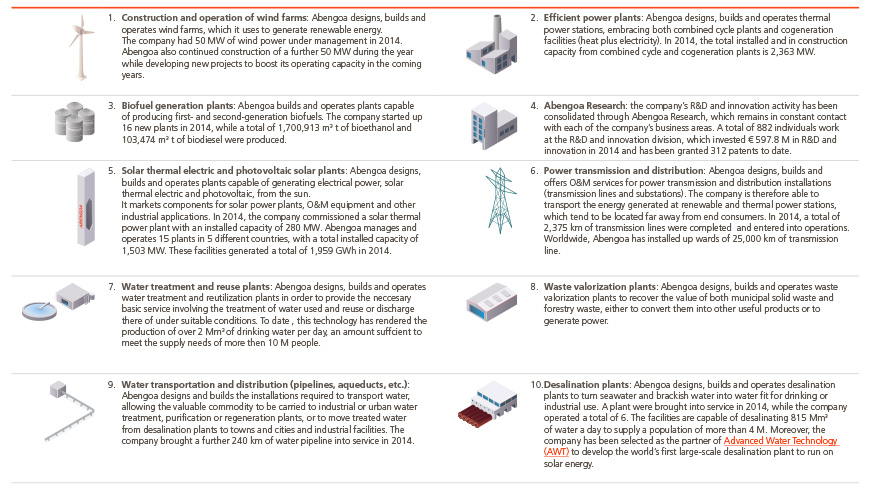Business model
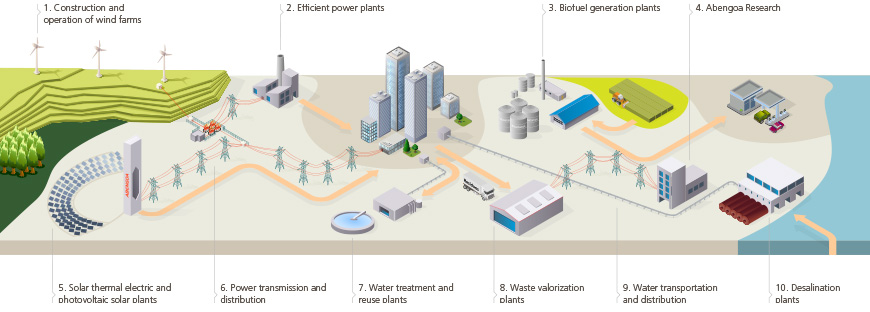
Abengoa applies innovative technology solutions for sustainability in the energy and environment sectors. It meets the basic needs of towns and cities centers and their inhabitants by generating and transporting energy and drinking water, producing biofuels, treating wastewater and valorizing waste.
Abengoa’s business focuses on two main activities strongly associated with technology and innovation: engineering and construction, on the one hand, and Operation and Maintenance (O&M) on the other, both including assets awarded under concession and technology-heavy free market business, such as biofuel production.
There are essentially three categories of project development and plant operation:
1. Turnkey: Abengoa designs and constructs the facility while the end client handles the operation (carried out by Engineering and Construction).
2. Concessions: Abengoa operates the plant over a given period (carried out by Engineering and Construction and Operation and Maintenance).
3. Industrial production: Abengoa develops proprietary technology, seeks out business opportunities and designs and constructs the facilities, which are then managed, operated and ultimately owned by Abengoa. Business here tends to focus on the production and sale of both first- and second-generation bioethanol (carried out by Engineering and Construction and O&M).
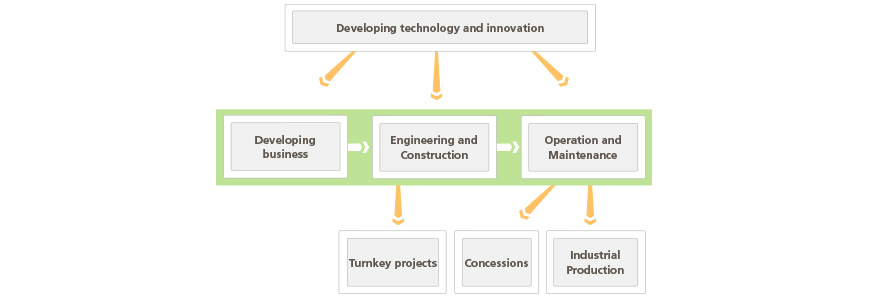
Technological distinctiveness is our trademark.
All of Abengoa’s lines of business are heavily based on technology and innovation, which are key to the company’s ongoing ability to access new markets (geographically and by business). The main lines of research center on new desalination technologies, developing and improving efficiency at solar power plants and developing catalysts, enzymes and new biofuel production techniques.
This technological slant is an Abengoa hallmark. It enables the company to integrate vertically throughout all its business areas, spanning the entire life cycle of the projects it undertakes. The company is therefore fully capable of developing its own technology (at its six research centers) and making it operational, whether for facilities under concession, industrial production or turnkey projects. A prime example of this commitment to innovation is the high R&D and innovation investment to EBITDA ratio, which stood at 36.6 % in 2014.
The success of this business model is largely driven by our human team, since the company’s presence in such a hugely specialized sector means only the very best professionals will do. Most projects are headed and coordinated by the company’s own personnel, who bring the necessary experience and know-how to meet the objectives that have been set.
Abengoa’s sharp internationalization, around 84 % of turnover generated outside Spain, means that the company seeks out new business opportunities in many different regions worldwide. Moreover, its tireless efforts at detecting and minimizing risk mean that it remains completely in control of any possible contingencies that could affect its projects. The main risks associated with each project are thoroughly assessed from the bidding phase through to project completion.
Abengoa worldwide
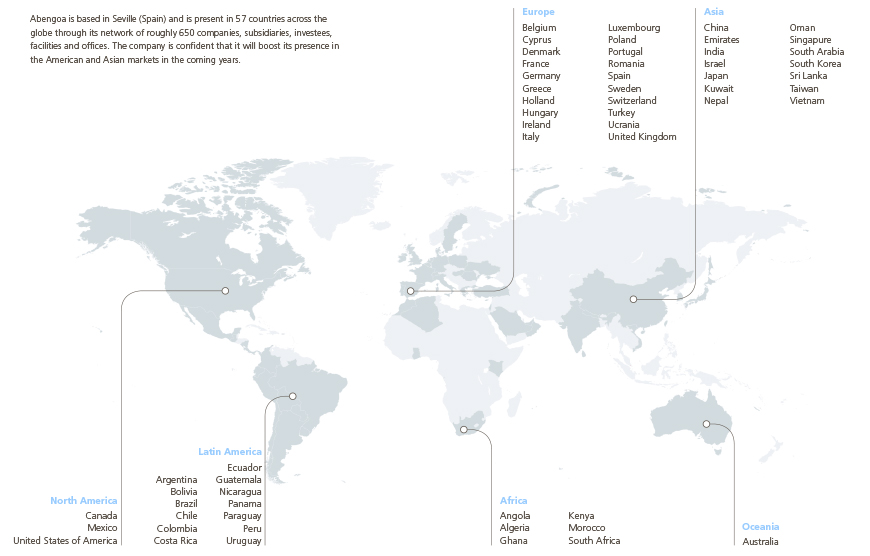
Abengoa’s value chain
In 2013 and 2014, Abengoa flagged the main elements in its value chain to analyze and better understand the impact and influence that each of these can have on its business while also improving transparency so that the company’s stakeholders are fully aware of the interactions taking place between the main players involved in the business.
Given Abengoa’s complex structure it is very important to map out its value chain. With this in mind, mapping out the chain provides a global picture of Abengoa’s activities and how the company works, with the ultimate aim of enhancing competitiveness and offering clients increasingly innovative products.
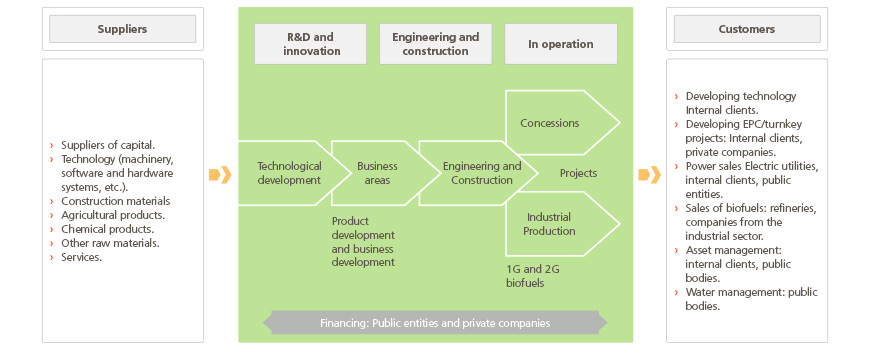
R&D and innovation, key to Abengoa’s business model
R&D and innovation is Abengoa’s main growth driver. It makes the company a leader in technology and affords it a competitive edge against its peers. Technological differentiation as a product of innovation opens up sustainable growth while providing the necessary resources to fuel R&D and innovation activity.

In 2014, the company invested € 597.8 M in R&D and innovation, representing 8.1 % of revenue. Most of this investment was put towards applied research and technological innovation, in line with the company’s strategic objectives. The total number of employees involved in R&D and innovation activity stood at 8821.
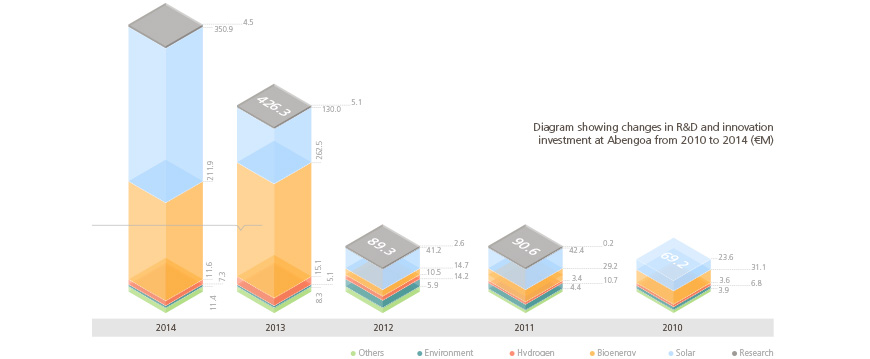
Thanks to innovation at Abengoa, numerous patents are applied for and obtained through the company’s Patents and Technology Oversight Office, which manages all activities involving intellectual and industrial property rights. At December 31, the company had 3122 patents (applied for and granted) since 2008.
Note 1: For more information about the R&D and innovation see Appendix A.
Note 2: Priority patent application
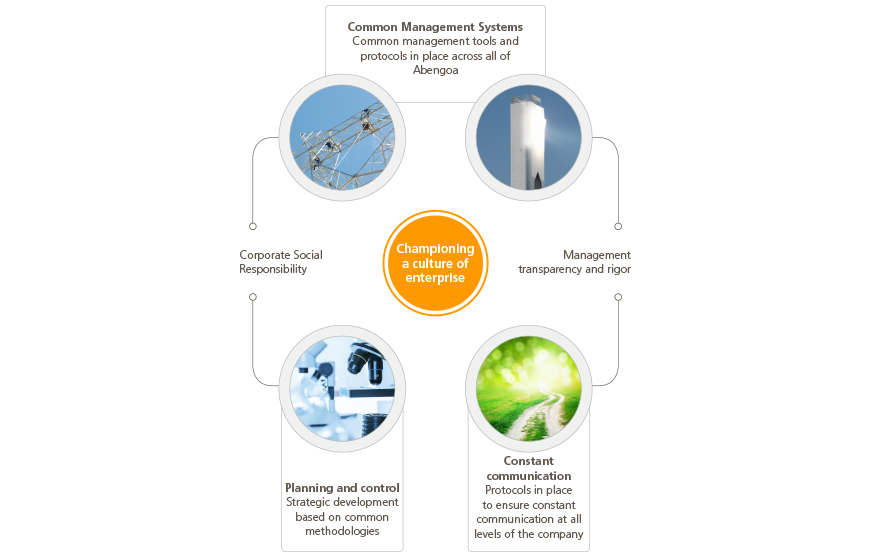
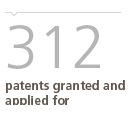
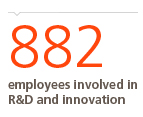
Abengoa Research
Abengoa’s commitment to an innovation-driven business model branching the entire company prompted the company to centralize its innovation activity in Abengoa Research.
The consolidation in 2014 of Abengoa Research addresses the need to generate science-related synergies between the different research areas and to focus R&D and innovation from a global market-based perspective.
By having a multi-disciplinary R&D and innovation center, the company is able to shift its research focus as needed and base research on areas of knowledge that affect and benefit different areas and divisions of the company to increase the effectiveness and reach of its research activity. Abengoa conducts research in the following fields of technology: thermoelectric and photovoltaic energy, power systems, biotechnology, chemical processes and a simulation group.
This new approach provides not only valuable scientific synergies, but also a much more complete vision of investment in R&D and innovation and the direct return on this investment. It also makes the company more versatile in tackling new challenges and developing future solutions.
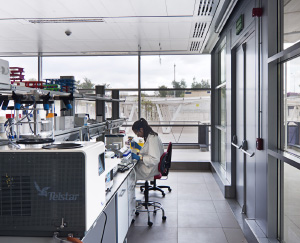
R&D and innovation Campus Palmas Altas laboratory, Seville (Spain).
![]()
New laboratories at Campus Palmas Altas
With the aim of centralizing all research activity at Abengoa Research, the company constructed and opened a number of multi-disciplinary laboratories in 2014 at Campus Palmas Altas, the company’s headquarters in Seville (Spain). The facilities have a combined floor area of 2,150 m2, and house a team of over 80 individuals, bringing together researchers, doctorate students and highly qualified laboratory technicians, all spread across the following research units:
- Thermofluids laboratory research at this facility centers on the study of new materials to improve the heat storage and transfer capacities of the salts/fluids used at solar thermal power plants.
- Electrics laboratory: this center explores the interactions between renewable generation plants and the commercial power grid to which they are connected, the aim being to improve and validate new plant control systems and the impact these renewable power plants have on the grid, while also studying how the plants can provide auxiliary services.
- Biotechnology laboratory: engaged in activities related to the development of bioproducts and biofuels, focusing on the improvement of microorganisms that generate compounds valuable for industry and enzymes to generate second-generation (2G) bioethanol or microorganisms for producing high added value bioproducts.
- Chemical processes laboratory: work here is largely focused on developing and characterizing new catalysts for bioenergy applications, such as developing new processes to obtain value added products from lignin, reformers and electrolyzers for the production of hydrogen and, lastly, processes for treating water and eliminating contaminants.
- Materials laboratory: employs techniques to synthesize and characterize new materials. These include materials designed for applications in photovoltaic, solar thermal and water treatment technologies.
Main projects
In 2014, Abengoa secured a large number of new contracts and completed many other projects across the globe. These projects come in many different shapes and forms, illustrating the different areas of business and sectors in which the company operates. Flagship projects for the year included:
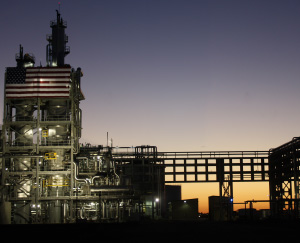
Hugoton plant, Kansas (U.S.).![]()
Largest solar thermal facility in South America
Abengoa will build a 110 MW solar thermal electric plant employing tower technology and a 100 MW capacity photovoltaic plant in the Atacama Desert, the region receiving the highest solar radiation in the world. The plant is expected to prevent the release of 870,000 t of CO2eq per annum.
Smart water management grid spanning 250 km in Turkey
Abengoa will handle the engineering, design and construction of the project, which has been arranged as a turnkey project. The grid will cover close to 250 km and will serve the city of Denizli and its population of roughly half a million.
World’s largest single-axis photovoltaic plant
With an installed capacity of 206 MW, the facility will generate enough energy for 72,000 households while curbing yearly CO22eq emissions by 356,000 t..
First second-generation biofuel plant
Abengoa unveiled the first commercial plant capable of producing bioethanol from cellulosic biomass, a huge milestone in terms of innovation since the raw materials or inputs used do not compete with grain otherwise used for food. The facility is expected to generate upwards of 94 ML of bioethanol a year.
World’s largest biomass plant
Worth in the region of € 315 million, and boasting an installed capacity of 215 MW of electrical power and 100 MW of thermal power, the plant runs solely on biomass. The facility will supply electrical power to industrial clients,and thermal energy to heat the city of Ghent (Belgium).
A business model with responsibility at its heart
The world needs solutions that push towards sustainable development.
This approach shapes the company’s mission, vision and values and is the hallmark of Abengoa.
Mission, vision and values
The company’s mission, vision and values are directly related to the business objectives it has set itself.
All lines of business operate in strict compliance with these three principles.
Mission: Abengoa is a technology company that applies groundbreaking solutions geared towards sustainable development in the energy and environment sectors. Company management champions a culture of enterprise and is heavily focused on social responsibility and transparency and rigor in management, thus providing long-term value to shareholders.
Vision: Abengoa aims to become an international benchmark in the development of groundbreaking technological solutions geared towards sustainable development.
The company’s management and business model are rooted in the following values:
- Integrity: Abengoa strives to operate honestly in everything it does, both within the company itself and with the communities in which its presence is felt.
- Legal compliance:each action undertaken by the company must be legally compliant so as to ensure legal security in relation to its work and reduce risks.
- Professional rigor: involvement in and full commitment to all Abengoa activities are essential to the company’s ongoing success.
- Reliability: discretion and prudence govern Abengoa’s relationships with stakeholders. This is absolutely essential it hopes to forge close ties and improve dialog and relations between the company and its surrounding community.
- Quality: excellence is present in all the products and services the company offers.

Moreover, the company has fully assumed the ten principles of the Global Compact.
Global Compact
Since 2002, Abengoa has remained fully committed to the Global Compact of the United Nations, meaning it has undertaken to honor and implement into its business, business model and strategy the ten principles.

Since 2005, Abengoa has been publishing a yearly Communication on Progress (COP), on the Global Compact website to inform its stakeholders of the actions carried out in the last year in relation to implementation of the governing ten principles. The report, which the company is under no obligation to prepare, also identifies the advances and improvements made in comparison to the previous year, making the company more transparent.
In 2014, the Global Compact Network Spain officially recognized Abengoa for the ten-plus years it has spent collaborating with the Global Compact.

